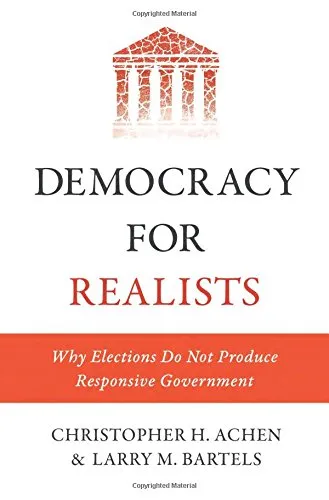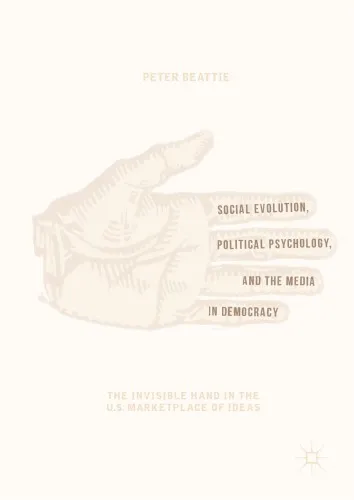Democracy for Realists: Why Elections Do Not Produce Responsive Government
4.5
بر اساس نظر کاربران

شما میتونید سوالاتتون در باره کتاب رو از هوش مصنوعیش بعد از ورود بپرسید
هر دانلود یا پرسش از هوش مصنوعی 2 امتیاز لازم دارد، برای بدست آوردن امتیاز رایگان، به صفحه ی راهنمای امتیازات سر بزنید و یک سری کار ارزشمند انجام بدینکتاب های مرتبط:
معرفی کتاب دموکراسی برای واقعبینان
کتاب Democracy for Realists: Why Elections Do Not Produce Responsive Government که به قلم «کریستوفر اچ. آچن» و «لری ام. بارتلز» نوشته شده است، یکی از مهمترین آثار در حوزه سیاستگذاری و تحلیل نظامهای دموکراتیک مدرن است. این کتاب به چالش کشیدن یکی از بزرگترین باورهای مرسوم در میان عموم و حتی بسیاری از نخبگان سیاسی میپردازد: اینکه انتخابات، دولتهای پاسخگوی واقعی ایجاد میکنند. نویسندگان با استفاده از شواهد محکم علمی و دادههای آماری، نشان میدهند که نظامهای انتخاباتی به شکلی که اغلب تصور میشود عمل نمیکنند و برداشتهای ایدهآلگرایانه از فرایندهای دموکراتیک، مبتنی بر توهمات بیشتر از واقعیات هستند.
خلاصهای جامع از کتاب
این کتاب با بررسی تاریخچه انتخاباتی ایالات متحده و دیگر نظامهای دموکراتیک دنیا آغاز میشود و نشان میدهد که تصمیمگیری رأیدهندگان به ندرت بر اساس سیاستگذاری منطقی یا منافع بلندمدت آنهاست. به جای آن، رأیدهندگان اغلب تحت تأثیر عواملی مانند هویت گروهی، احساسات قومی، یا حتی رویدادهای تصادفی مانند وضعیت آبوهوای روز انتخابات تصمیمگیری میکنند.
نویسندگان در این کتاب با تأکید بر مفهومی به نام "Group Theory of Democracy" توضیح میدهند که مردم عمدتاً بر اساس وابستگیهای گروهی و هویتی خود عمل میکنند، نه بر اساس تحلیل منطقی از برنامههای سیاستگذاری کاندیداها.
فصلهای کتاب به تحلیل انتقادی مدلهای سنتی نظریه دموکراسی میپردازند و نشان میدهند که این مدلها چگونه در توضیح رفتار واقعی رأیدهندگان شکست میخورند. علاوه بر این، دادهها و تحلیلهای تجربی گوناگونی ارائه میشود که عدم ارتباط مستقیم بین خواستههای رأیدهندگان و عملکرد واقعی دولتهای منتخب را به تصویر میکشد.
نکات کلیدی
- نظریه سنتی دموکراسی که رأیدهندگان را عاملان منطقی میپندارد، اغلب کارایی کمی در توضیح رفتار آنها دارد.
- هویت گروهی و وابستگیهای اجتماعی، نقش بسیار مهمتری نسبت به مسائل سیاستگذاری در تصمیمگیری رأیدهندگان دارند.
- دولتهای دموکراتیک کمتر از آنچه انتظار میرود به نیازها و خواستههای واقعی رأیدهندگان پاسخگو هستند.
- راهحل تغییر این وضعیت در اصلاح ساختارهای نهادی و سیاستگذاری نیست؛ بلکه شناخت واقعیتهای روانشناختی انتخابات است.
جملات معروف از کتاب
"دموکراسی در عمل با آنچه در نظریه کلاسیک پیشبینی میشود فاصله زیادی دارد. مردم رأی نمیدهند که پاسخگو باشند؛ آنها رأی میدهند تا هویت خود را ابراز کنند."
"اگرچه دموکراسی به عنوان نظامی برای پاسخگویی به نیازهای انسانی فروخته شده است، اما تجربه نشان داده است که تضاد میان گروهها یکی از بزرگترین نیروهای شکلدهنده به آن است."
چرا این کتاب مهم است؟
در دنیایی که دموکراسی به عنوان بهترین شکل حکومت معرفی شده است، این کتاب به شکلی ریشهای دیدگاه ما را نسبت به این سیستم به چالش میکشد. تصمیمگیری رأیدهندگان، ناکارآمدی دولتهای منتخب، و قدرت انگیزههای گروهی از مسائلی هستند که درک ما از سیاستهای دموکراتیک را متحول میکنند.
این کتاب فقط یک تحلیل علمی نیست، بلکه دعوتی است به بازنگری در باورها و تصوراتمان از سیستم دموکراتیک در سطح جهانی. نویسندگان تلاش کردهاند تا با ارائه شواهد و استدلالهایی محکم، درک عمیقتری از رفتار انتخاباتی و پیامدهای آن به ما بدهند.
اگر به حوزه سیاست، جامعهشناسی، و سیستمهای دموکراتیک علاقه دارید، این کتاب یکی از آن آثار است که دیدگاه شما را نه تنها به چالش میکشد، بلکه گسترش میدهد.
Introduction to 'Democracy for Realists: Why Elections Do Not Produce Responsive Government'
"Democracy for Realists: Why Elections Do Not Produce Responsive Government," written by Christopher H. Achen and Larry M. Bartels, fundamentally challenges long-standing myths about democratic governance. In this groundbreaking book, the authors dismantle the traditional "folk theory" of democracy, which holds that elections are a reliable mechanism for reflecting the "will of the people." Instead, they present a sobering yet profoundly important analysis of how voters make decisions, why democratic systems often fall short of their ideals, and what political scientists, policymakers, and citizens must understand to engage with democracy more realistically.
Through meticulous research, compelling evidence, and accessible prose, Achen and Bartels reveal the inadequacies of conventional democratic theories. They argue that voter preferences are often shaped more by group identities, social loyalties, and fleeting events than by careful consideration of policy issues or ideological commitments. This book not only questions the effectiveness of elections in producing responsive governance but also calls for a better-informed approach to democratic reform.
A Detailed Summary of the Book
"Democracy for Realists" is structured around a central argument: the "folk theory" of democracy, which posits that voters are rational actors able to deliberate on issues and choose leaders who best represent their preferences, fails to describe how democracy actually functions. The book’s central thesis dismantles this idealistic perception of elections and reveals a more complex, and often unsettling, reality.
Achen and Bartels delve into the evidence to show that voters—contrary to the folk theory—rarely possess the clarity, rationality, or independence required for their votes to reflect their actual policy preferences. Instead, the authors identify "group theory" as a more accurate framework for understanding democracy. According to this perspective, voting behavior is heavily influenced by partisan identities, religious affiliations, ethnic loyalties, and other forms of group attachment. These attachments frequently overpower individual agency and policy awareness.
The authors also address the role of retrospective voting, where citizens assess leaders based not on policy outcomes but rather on simplistic and often irrelevant metrics like economic trends or even natural disasters. Achen and Bartels highlight shocking examples—such as voters punishing incumbents for droughts or shark attacks—to illustrate how misplaced accountability undermines the democratic process.
In the latter sections of the book, the authors critique the effectiveness of elections as a mechanism for achieving responsive governance. They argue that democratic systems often fail to produce the outcomes idealized by the folk theory. Nevertheless, the book does not dismiss democracy altogether but instead calls for a more realistic understanding of its limitations and potential. This understanding, they contend, is essential for designing reforms that can make democratic systems more robust and effective.
Key Takeaways
- The "folk theory" of democracy, which assumes voters are rational decision-makers, is fundamentally flawed.
- Group identities, rather than individual policy preferences, dominate voter behavior.
- Retrospective voting often leads to irrational or misplaced forms of accountability.
- Democracy is not inherently responsive; its effectiveness depends on realistic approaches to reform.
- Understanding the limitations of voters and electoral systems is crucial for addressing democracy's shortcomings.
Famous Quotes from the Book
"Democracy is a harshly competitive institution that compels politicians to respond to whatever motivates their constituents—that is, whatever wins votes."
"Voters are like fans at a sporting event: they cheer for their side, not because of the team’s policy positions but because they identify emotionally with the team."
"Elections rarely resolve ideological debates or produce coherent policy directions. Instead, they affirm group loyalties and collective identities."
Why This Book Matters
"Democracy for Realists" is an essential read for anyone who wishes to understand the true nature of democratic governance. While its conclusions may challenge conventional wisdom about elections and representation, the book’s insights are crucial for addressing the real challenges facing modern democracies.
The work is especially relevant in today’s polarized political climate, where misinformation, populist appeals, and identity politics dominate electoral outcomes. Achen and Bartels provide readers—not just political scientists but citizens, activists, and policymakers—with the analytical tools to comprehend the vulnerabilities within democratic systems. By highlighting the discrepancies between democratic ideals and democratic realities, the book encourages meaningful conversations about how democratic institutions can adapt and improve.
Ultimately, this book matters because it strips away idealistic assumptions and confronts difficult truths about democracy. By embracing a more realistic understanding, societies can work toward reforms that preserve the integrity and effectiveness of democratic governance for future generations.
دانلود رایگان مستقیم
You Can Download this book after Login
دسترسی به کتابها از طریق پلتفرمهای قانونی و کتابخانههای عمومی نه تنها از حقوق نویسندگان و ناشران حمایت میکند، بلکه به پایداری فرهنگ کتابخوانی نیز کمک میرساند. پیش از دانلود، لحظهای به بررسی این گزینهها فکر کنید.
این کتاب رو در پلتفرم های دیگه ببینید
WorldCat به شما کمک میکنه تا کتاب ها رو در کتابخانه های سراسر دنیا پیدا کنید
امتیازها، نظرات تخصصی و صحبت ها درباره کتاب را در Goodreads ببینید
کتابهای کمیاب یا دست دوم را در AbeBooks پیدا کنید و بخرید
1261
بازدید4.5
امتیاز50
نظر98%
رضایتنظرات:
4.5
بر اساس 0 نظر کاربران
"کیفیت چاپ عالی بود، خیلی راضیام"



